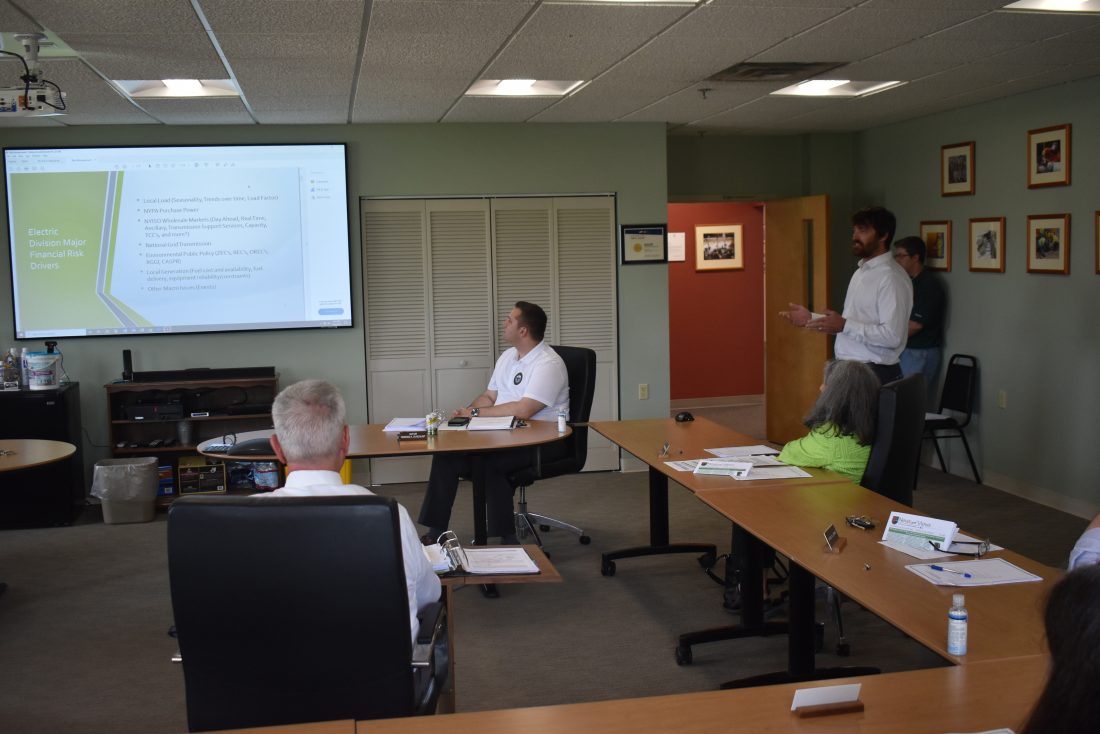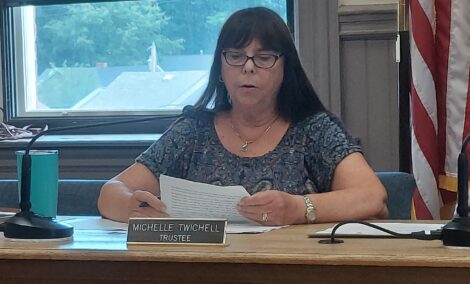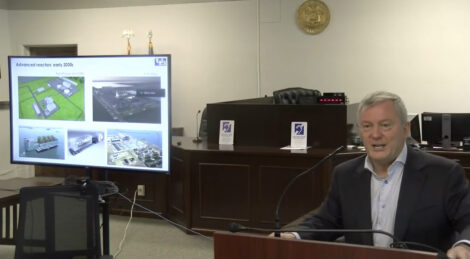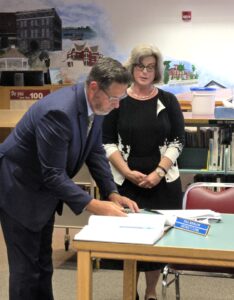BPU Solid Waste Containers Have Been Delivered

Standing right, Kristofor Sellstrom, Jamestown Board of Public Utilities gas and energy resources manager, discussing the risk management program during an in-person board meeting Monday. P-J photo by Dennis Phillips
It was supposed to take two to three weeks to complete the delivery of more than 14,000 solid waste containers for the new Jamestown Board of Public Utilities program, but it was done in a shorter time frame.
On Monday, David Leathers, BPU general manager, said it took only 10 days for almost all of the containers to be delivered to solid waste customers. He said, so far, the program’s start is “pretty good.” He added, initially, there was a lot of talk about providing smaller containers to some customers.
The main container that was delivered to customers was 95 gallons. However, for elderly or disabled customers, the BPU provided the option for people to opt out of the 95-gallon container to receive a 35-gallon container. Leathers said of the 500 35-gallon containers the BPU received, almost all have been distributed. He said the distribution of the garbage containers ran smoother than when the BPU delivered new orange recycling containers in 2014.
The new containers are part of the BPU’s new “Assigned Garbage Container Program.” The containers are the property of the utility company and are assigned to each service address. Customers may begin using the containers as soon as they receive them. The program formally starts July 1.
“This gives everyone about six weeks to try it out,” he said. “I’m pleased everyone has it before we go live.”
Leathers said an early assessment of the program has revealed one problem with the tipping system for the new garbage container. He said each BPU solid waste truck has one tipping system, which has caused some issues with how garbage is being dumped in the same area of the truck. He added staff will continue to re-evaluate that situation to see if a better solution can be found.
One of the reasons the new solid waste container program was started was because only about two-thirds of BPU customers were using a garbage can, Leathers said. He said BPU officials knew there would be some criticism of the new program because it impacts many people.
“We are changing how they deal with garbage,” he said.
In other business:
¯ The board approved two resolutions to purchase three property lots off Manchester Road in the city. One of the approved resolutions was to purchase a 1-acre and a 4-acre lot for the combined price of $10,500. The other resolution was to purchase 17 acres of land for $40,000.
Leathers said the purchase of the land is the first step in a possible solar project in the city. He said the purchase of land is always the first step in such a process.
¯ Kristofer Sellstrom, BPU gas and energy resource manager, presented the board the risk management program annual report. He said the electric load, or consumption, in the city continues to decrease, which it has been doing since 2003. He added that economic downturns like the 2008 housing crisis and the COVID-19 pandemic has not improved the decrease of power consumption in the city.
“It’s an indication our community is not growing. It’s shrinking,” he said.
Sellstrom said the electric load was down 7% in 2019. Comparatively, electric consumption only decreased by 3% in 2018.
During the risk management presentation, Sellstrom also discussed the state’s Climate Leadership and Community Protection Act, which is also known as the “Green New Deal,” which was approved by the state Legislature in 2019. The act requires that the state have net-zero carbon economy by 2050, which includes 70% renewable energy by 2030.
Because of the state’s Clean Energy Standard, which was approved in 2016, state officials created two new mechanism to meet the state’s energy goals, renewable energy credits (RECs) and zero emission credits (ZECs).
Sellstrom said it is projected that the RECs and ZECs will cost BPU customers $111 million during 19 years to meet the state’s energy goals. He said BPU officials could possibly decrease how much they pay for RECs via renewable energy projects, like the possible solar project discussed by the board when approving the purchase of property earlier in the meeting. He added in 2020 the BPU paid $268,000 for RECs, which was an $187,000 increase compared to the $81,000 it appropriated in 2019. The money the BPU pays for Green New Deal associated cost is paid for by customers in the fuel adjustment charge.





